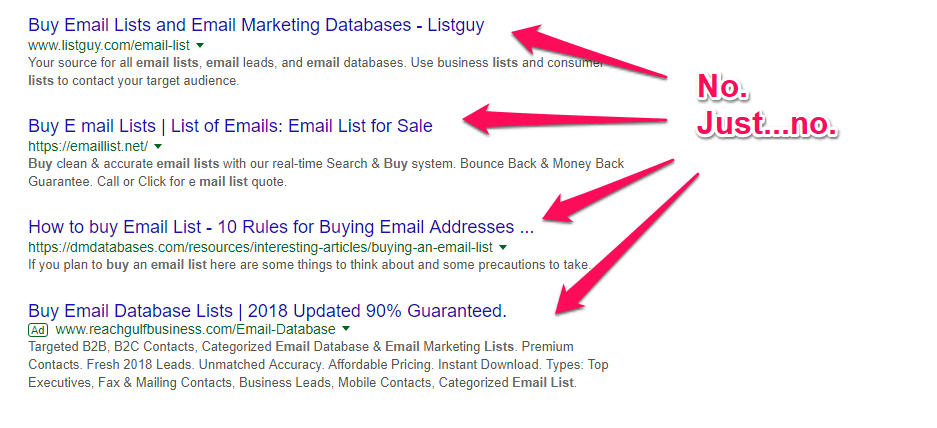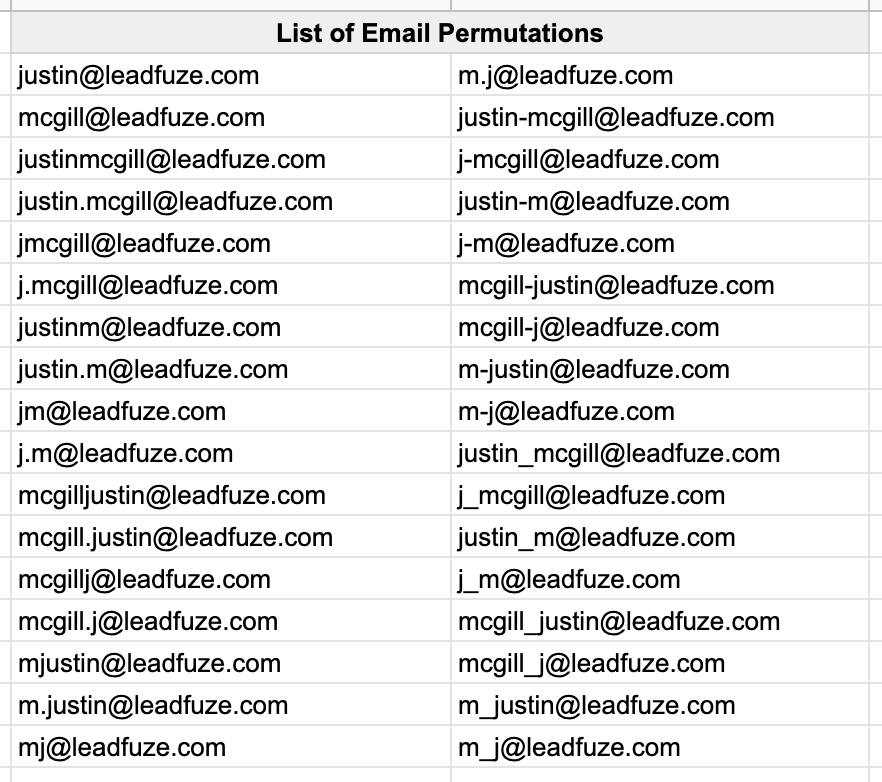Expert Facts To Selecting An Email List Website
Expert Facts To Selecting An Email List Website
Blog Article
What Factors Should I Consider When Buying The Cpa Email List?
Be aware of these points when buying the CPA list (Certified Public Accountant). It is important to ensure that you get a list that is current high-quality, and in compliance with legal guidelines. Here's what to look for:1. Data Quality and Accuracy
The source of the data: Verify the source of the information. Reputable providers usually gather information from reliable sources such as professional directories and trade associations. Avoid lists created using scraping and unreliable methods as they may contain outdated or inaccurate data.
Verification: Check that the email address list is recently verified. It will reduce bounce rates, and also ensure that the email addresses are valid. Inquire whether the list is regularly kept up-to-date and maintained, since CPAs often change their jobs or companies.
Segmentation & Filters Segmentation and Filters: A CPA list that is useful will include options like segmentation based on location (city or state, or even country) and specialization in specific industries (e.g. auditing, taxation and financial planning) as well as experiences years, size of the firm, etc. Your ads will be more relevant if you use targeted targeting using the above-mentioned factors.
2. Legal Regulations
Data Privacy Laws : Ensure compliance with local privacy laws for data, including the California Consumer Privacy Act and the General Data Protection Regulation. Lists must include email addresses that have been legally obtained and have been acquired with the proper consent.
Conformity with the CANSPAM Act The list of addresses used in U.S. commercial email campaigns must comply to the CANSPAM Act. The list should include opt-out procedures and avoid misleading content or subject line. Non-compliance can lead to penalties and legal problems.
Opt-In Consent: Make sure that you have obtained the email address through an opt in consent. That is, recipients who have signed a consent form agree to be targeted by marketing from third party. This reduces the risk of spam complaints. It also increases engagement.
3. Provider Reputation
The reputation of the company is something that needs to be investigated thoroughly. You can assess the past experiences of previous customers by looking up reviews, case study, and testimonials. Established providers who have a proven track of performance are more likely not to provide quality and reliable information.
Transparency: The company should be transparent about the way in which the data was gathered and when it's up-to-date. If the company does not provide clear explanations of their method, then it is a red light.
Customer Support: If you require assistance with list customization troubleshooting or understanding compliance rules it is crucial to be able to provide reliable customer service. Good support can save you time and money throughout the campaign.
4. Cost and ROI
Pricing Models. Different providers offer various pricing structures. Some charge per contact, whereas others charge a flat rate or subscription. Review costs against ROI and weigh price against high-end.
Refund Policy: Learn whether there is a procedure for refunds or replacements in the event that there is a problem with a set of emails were not correct or in error. A guarantee provides security.
Cost vs. Value: Don't concentrate only on the price. If the list isn't of good quality, a less expensive one might look appealing, but it could result in low engagement rates or high bounce rates. You should consider lists that provide precision in data and segmentation.
5. Data Usage and ownership
Purchase the list one time or buy it multiple times. While a single-use list might be more affordable, having your own list allows you to run longer-term campaigns.
Shared Lists: Determine if the list is solely yours or shared by multiple buyers. shared lists: Make sure you know whether your email list is exclusive to your company or if other buyers can also access it. Shared lists could lead to the audience becoming tired, especially if those who are on it are bombarded by marketing emails.
6. Data Integration and Format
CRM Compatibility: Ensure the list is in a format that works with your CRM or email marketing software such as CSV or Excel. This will ensure easy management of data as well as its transfer.
Ease Of Use: Determine how easily data can be separated and managed following integration into your system. A well-organized database can enhance targeting and personalization.
7. Ethical Questions
Relevance and Value of Content The importance of content is that CPAs work hard, it is essential that you send content that is both pertinent and beneficial. Sending irrelevant messages can harm your reputation and cause more complaints about spam.
Avoid Over-Emailing. Be mindful of the frequency at which you email contacts from the list. Over-communication might lead to unsubscribes from your list, or even spam complaints. Both of these can affect the reputation of your sender.
We also have a conclusion.
If you're buying a CPA mailing list, be sure that you prioritize the data's quality, compliance with legal requirements, and reputation of your provider. This will ensure that you're making a good investment. Effective segmentation and ethical practices can maximize engagement and ROI and maintain a positive image of your company. Follow the pro cpa email list for site recommendations.
What Should I Consider Before Buying A Data Appending System?
If you are considering a data appending service it is crucial to consider various factors to make sure that the appending service improves the accuracy of your existing information while maintaining compliance, accuracy, and moral standards. Data appending involves adding missing data to your database, for example, demographic data such as phone numbers, email addresses or even phone addresses. Be aware of these aspects when purchasing the data appending service. Data Accuracy
Source of Data: Verify that the company appending data uses trustworthy, high-quality sources such as public records or opt-in directories. Reputable service providers usually gather data from reliable sources. They guarantee that the appended information is correct and current.
Verification Process Ensure that the service provider has an extensive procedure to verify and validate the appended data. This ensures that the data is up-to-date, accurate and relevant to your requirements. The provider should provide periodic updates and data cleaning processes.
Match Rate: Every provider has a unique match rate, which is the percentage of records that you can improve by adding new information. Try to strike an equilibrium between a high match rate and accuracy of data. High match rates are important but not at the price of the quality of your data.
Customization: If you have specific needs, make sure the company you choose to use offers custom data append solutions. It could include appending different kinds of data like contact information, behavioral data or firmographic and demographic information.
2. Data Security and Privacy
Compliance with Regulations – Data appending is a service that involves handling sensitive personal information. It is therefore crucial to ensure compliance with privacy laws such as the California Consumer Privacy Act and General Data Protection Regulation. The data appended must be processed and used legally so as to stay clear of penalties or reputational damage, as well as other penalties.
Consent Management: Make sure that the information you are sharing comes from individuals who have provided explicit permission for their personal information to be disclosed. Avoid data sources which rely on questionable methods or infringe privacy. These could lead to legal and ethical problems.
Data Security: Make sure that the company you choose to use strict security measures for data to protect both the integrity and confidentiality your existing database, as well as the information appended. Secure data transfers, encryption and access control are all aspects of this.
3. Provider Reputation
Vendor with a Reputable Name: Choose a company that has an excellent reputation for providing data appending solutions that are reliable and compliant. Check out reviews, testimonials, and case studies to assess their past performance. A vendor that has been operating for a while is likely to offer high-quality service and adhere to the laws.
Industry Specialization: Some providers specialize in specific industries like finance, healthcare, or retail. Choose a provider with the expertise and knowledge in your particular niche if you have a business that operates in such a market. They could provide more customized solutions that meet your particular needs.
4. Return on Investment and cost (ROI)
Pricing Models: Data appending services provide a range of pricing options. They include flat fees for bulk updates and per-record fees. Make sure you are informed of the pricing structure and how it aligns to your budget. Be wary of extremely low-cost options, as they may be a sign of poor quality data.
Determine your ROI potential by adding data. A good service can increase engagement, boost conversions and improve overall performance. Consider the price in relation to the expected benefits of having more detailed, actionable analytics.
5. Data Types and Appending Options
You should think about the type of data to add to your database. Some common types include:
Email addresses are crucial for email marketing campaigns.
Phone numbers are essential for sales outreach or Customer Support.
Demographic data can be utilized to segment and focus marketing.
Firmographic Data: A must for B2B firms that are targeting businesses based on revenue or employee size.
Social Media Profiles: Some companies offer the option of appending social media handles. This could aid in your digital and social media marketing efforts.
6. Data Integration and Format
Compatibility. Make sure that the data you add is compatible with the tools or systems you use, such as your CRM system for customer relationship (CRM) as well as marketing automation software or other software. CSV or Excel formats, as well as API integrations, are all standard formats. They should permit data to be imported and used easily.
Data Cleansing and Enrichment Services: As part of the appending service, a good provider will also provide data cleansing services. The appending process includes the correction of inaccurate data and duplicates, and removing older records. Data enrichment goes beyond just adding new data. It also enhances your database's overall performance.
7. Ethical Aspects
Transparency. Providers must be open and transparent regarding how and where data is collected. Ethical services for data appending will follow strict guidelines for the source of data and how to use it. They make sure that data is collected legally and in a transparent manner.
Be aware that adding information like email addresses or telephone numbers should not be used in a spammy manner. Use the appended information responsibly and make sure you adhere to best practices regarding outreach, opt-out choices, and privacy of the consumer.
Conclusion
Concentrate on the quality of data and legal compliance when selecting providers for data appending. Pick services that offer secure, validated data that complies privacy regulations such as GDPR as well as CCPA. Also, make sure that the added data is compatible with your system and think about the long-term benefits by investing in accurate, rich data. If you select the correct data appending provider and focusing your efforts on ethical methods, you can greatly enhance the effectiveness of your marketing and also your business's performance. Check out the top data appending services for site guide.